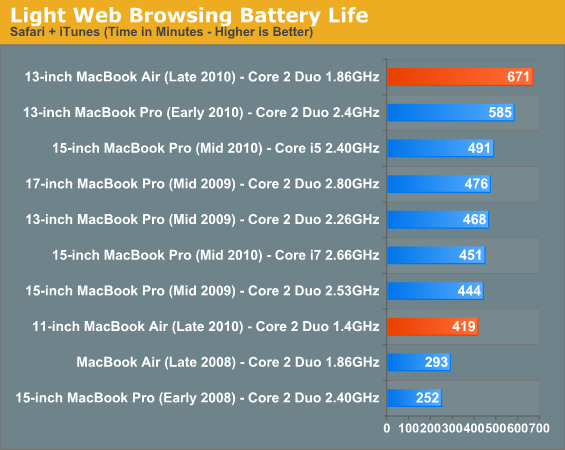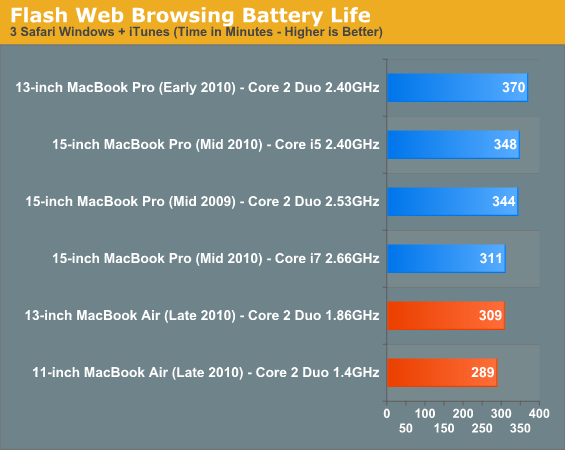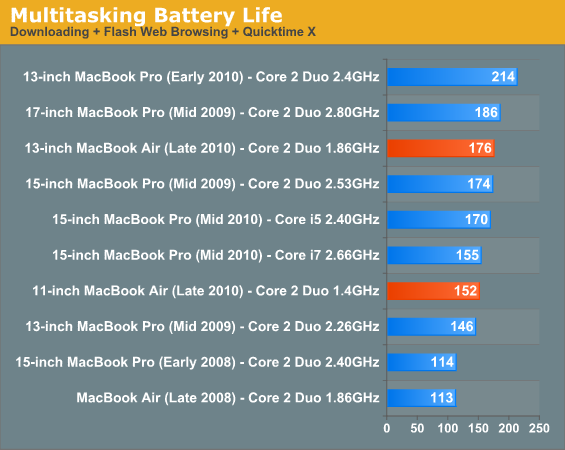Apple's 2010 MacBook Air (11 & 13 inch) Thoroughly Reviewed
by Anand Lal Shimpi on October 26, 2010 10:08 PM EST- Posted in
- Mac
- Apple
- MacBook Air
- Laptops
The Battery Life
Light Web Browsing
Here we're simply listing to MP3s in iTunes on repeat while browsing through a series of webpages with no flash on them. Each page forwards on to the next in the series after 20 seconds.
The display is kept at 50% brightness, all screen savers are disabled, but the hard drive is allowed to go to sleep if there's no disk activity. The wireless connection is enabled and connected to a local access point less than 20 feet away. This test represents the longest battery life you can achieve on the platform while doing minimal work. The results here are comparable to what you'd see typing a document in TextEdit or reading documents.

As glorified typewriters, you can’t beat the battery life offered by the MacBook Air. Light web browsing, document creation and music playback have minimal impact on the Air’s battery life. In fact, we actually beat Apple’s battery life claims in our light tests. The 11-inch Air delivers nearly 7 hours on a single charge and the 13-inch managed 11.2 hours. For a writer, you can’t do better than this.
Flash Web Browsing
The test here has three Safari windows open, each browsing a set of web pages with between 1 - 4 animated flash ads per page, at the same time. Each page forwards onto the next after about 20 seconds.
As always, the display is set to 50% brightness, audio at two bars, screensaver disabled and the hard drive is allowed to go to sleep if idle. The wireless connection is enabled and connected to a local access point less than 20 feet away.

If you use the MacBook Air as a full function P...err Mac, the battery life drops steadily. In our Flash web browsing test battery life dropped to 4 - 5 hours depending on which Air you’re looking at. And the difference between the two isn’t all that great. The 13-inch only managed an extra 30 minutes of battery life.
Multitasking Battery Life
Our final battery life test is the worst case scenario. In this test we have three open Safari windows, each browsing a set of web pages with between 1 - 4 flash ads per page, at the same time. We're also playing an XviD video in a window all while downloading files from a server at 500KB/s.

Our heavy multitasking test is the biggest issue. Neither MacBook Air was able to deliver more than 3 hours of battery life on a single charge. The problem here isn’t just battery capacity but also the performance of the CPUs themselves. A major component of long lasting mobile battery life is a concept known as rush to idle.
Let’s say we have two CPUs. The first is an ultra low power CPU that only consumes 10W under load, but 0.5W at idle. The second is a high performance CPU that consumes 40W under load and 1W at idle. If it takes the first CPU 5ms to decode a frame of video at 10W but the second CPU can do it in 1ms, the total energy consumed over 33ms is is 0.064J for the first CPU and only 0.036J for the second CPU.
The longer the first CPU is idle, the more its typical and idle power advantages will come into play (hence the results in the light web browsing test). The more CPU bound the workload however, the more the advantage over the second more high performance CPU will disappear. Our heavy downloading/multitasking test is the most CPU bound of all of our battery life tests and the workload is consistent regardless of how fast you execute it. In other words, a faster CPU won’t be able to do more work, it’ll just be able to rush to idle quicker.
The battery life story boils down to your usage model, even more so than with the MacBook Pro. Light users are going to get wonderful battery life out of the new MacBook Air, particularly the 13-inch model. However, if you are the type of user who does a lot of multitasking or if you’re running particularly CPU intensive apps (e.g. Photoshop, iMovie, etc...) then these two notebooks will hardly last you. I suspect this is the distinction Apple is looking to make. If you’re a regular user, just playing around on Gmail and browsing the web then the MacBook Air is all you’ll need. If you are doing any work with your machine however, you’ll want to look towards the MacBook Pro.










185 Comments
View All Comments
khimera2000 - Wednesday, October 27, 2010 - link
I love me m11x R2 :D looking at this thing... im happy that its still speedier, and i dont care who you are something as thin as the macbook would freak me the !@#$ out if i droped it... more so then the one i have right now. (mono frame = expensive fix)The0ne - Wednesday, October 27, 2010 - link
"I really like the form factor of the 11-inch MacBook Air. It's great to carry around. It's like an iPad for people who have to get real work done. I just wish it was faster. If Intel made a 32nm Core 2 Duo, clocked high enough the 11 would be perfect. I guess that’s what Atom is eventually supposed to be, but right now the performance is just too low."Essentially this means the 11" MacBook is NOT suitable unless you want to wait and wait. You won't get any "real work done" by any means as it is. So why even bother to praise it and at the same time downgrade it.
A netbook is both usable AND CHEAP. These are not and thus should not be called or even be consider netbooks. That's just crazy talk there. Might as well call all the rest of the ultra light notebooks netbooks.
kmmatney - Wednesday, October 27, 2010 - link
It has an SSD, so no, you don't need to wait and wait. I agree with Anand's review - it is like a netbook in terms of portability, but its much faster, and has a much better screen. It's certainly more usable than the average netbook.KarateBob - Wednesday, October 27, 2010 - link
Good review so far, until you listed the system temperatures in Fahrenheit. I understand Apple lists the temps in (F), but the industry-standard units for temperature reading is Celcius. It's what most enthusiasts can understand. (ie. We 60C is getting hot for a pre-i7 CPU, but I couldn't tell you what 60C is in F)Can you please add Celcius numbers to the review, perhaps next to the Fahrenheit numbers, it will make the article much more comprehensible. Thanks
Sufo - Wednesday, October 27, 2010 - link
I was just about to make this point - good thing i read through the comments before hand heh.I was very very disappointed by the use of F here at all, let alone it being the only scale used. Technical hardware reviews, for me, fall into the realm of science (albeit loosely) and C is the de facto standard in the scientific world (well, at least while it isn't K). Many component monitoring applications do not even have the option to display temps in F, and if they do, it is rarely (if ever) the default selection.
So +1 to the request for at least displaying both numbers in future, and perhaps you could consider dropping F completely as i'd argue it has no context within the world of computing hardware.
Anand Lal Shimpi - Wednesday, October 27, 2010 - link
Temperatures in C as well as F are both present now :)Take care,
Anand
SraCet - Wednesday, October 27, 2010 - link
To the reviewers and many commenters, it is tedious to listen to you divide the world into people who do "real work" and people who just fool around with IM and check Facebook.I do software development and scientific computing and for my purposes, the 11.6" MacBook Air is more than powerful enough.
Reading your review, it sounds like the only things you consider "real work" are editing 12 megapixel photos, doing 3D renders, and (ironically) playing 3D video games.
5 years ago, a 1.4GHz Core 2 Duo would have almost been the fastest CPU money could buy. Are you saying that people only started doing "real work" with their computers sometime in the last 5 years?
Sorry, let me go back to writing code and running simulations, and stop interrupting your "real work"--i.e., resizing your pretty pictures because you took them at 20 times the resolution you actually needed for web publishing.
Sufo - Wednesday, October 27, 2010 - link
"5 years ago, a 1.4GHz Core 2 Duo would have almost been the fastest CPU money could buy. Are you saying that people only started doing "real work" with their computers sometime in the last 5 years?"Well, only if you interpret his comments as suggesting that these tasks are _impossible_ to perform on the 11" MBA. Of course, that would be a gross misinterpretation - as i'm sure you can see. A more relevant extrapolation might be that 5 years ago, performing said tasks was a sluggish and intolerable chore - and on that we probably see eye to eye.
As for the "real work" slur - i can understand your frustration, however you must realise that a large part (probably the largest part) of the non-casual MBA-buying demographic will be people who consider the "real work" of the article as well... "real work" - and you can't get angry at the reviewers for trying to include usage statistics tailored to the people most likely to be buying the device. If anything it is to their credit. Similarly, it is unrealistic to expect them to cover every single usage scenario.
SraCet - Wednesday, October 27, 2010 - link
I suspect a very small percentage of professionals do anything that would stress out a Core 2 Duo. Most people do word processing, spreadsheets, presentations, e-mail. Editing and compiling code (developers). Accessing other computers remotely (IT types). Web browsing for business, like arranging travel. etc. etc.According to the reviewers, and apparently you, all of this stuff can be lumped in with "casual" (your word) use and is not "real work" because it can be done without taxing a dual core 1.4GHz processor.
Sufo - Friday, October 29, 2010 - link
Ah, you've somewhat misinterpreted me here - the term "non-casual" was merely meant to identify people who use their machine for work purposes. Perhaps i should have used "professional". My overall point (as misguided as it may be) was really only alluding to the generalisation that most people who buy macs are artsy, journalist types - for whom editing pictures and obscenely flash-heavy websites etc is their normal, "real" workload. And yes, i realise this thread is dead :)